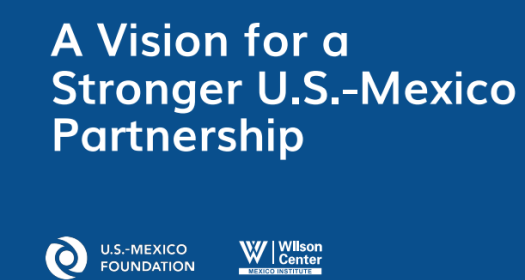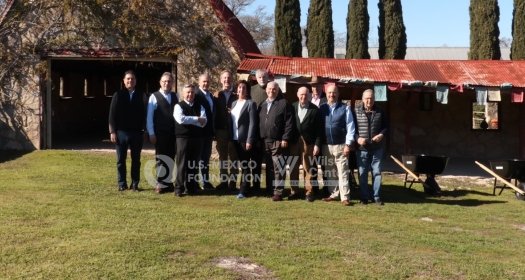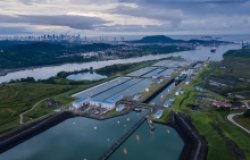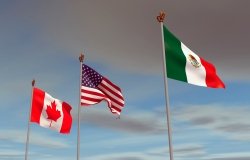Alamy
Webcast | Report Launch and Conversation on U.S.-Mexico Relations with Current and Former Ambassadors
The Wilson Center's Mexico Institute and the U.S.-Mexico Foundation were pleased to host a virtual launch of our joint report "Convocation: A Vision for a Stronger U.S.-Mexico Partnership" and a conversation on U.S.-Mexico relations with current and former ambassadors.
Overview
Hosted by:

U.S.-Mexico Foundation / Wilson Center
With Mexican President Lopez Obrador's recent visit to the United States to meet with President Trump, it is an opportune moment to reflect on the importance of the bilateral relationship and to set forth principles for a stronger future. In this context, the Wilson Center's Mexico Institute and the U.S.-Mexico Foundation were pleased to host a virtual launch of our joint report Convocation: A Vision for a Stronger U.S.-Mexico Partnership. We were honored to have the participation of Ambassadors Bárcena and Landau in addition to former ambassadors Basáñez, Jones, Sarukhan, and Wayne.
In January 2020, the U.S.-Mexico Foundation and the Wilson Center's Mexico Institute brought together six former U.S. Ambassadors to Mexico and six former Mexican Ambassadors to the United States to discuss the bilateral relationship in Blanco, Texas. The ambassadors engaged in an intensive and strategic dialogue concerning the future of U.S.-Mexico relations in critical areas. Out of this Convocation, we produced a report, which outlines specific recommendations in each of the three traditional pillars of U.S.-Mexico relations: trade and competitiveness; security and the rule of law; and migration. The report also addresses the need for sustained efforts to develop and consolidate public support for bilateral partnership and the importance of building strong and dynamic institutions to coordinate across government agencies and to sustain high-level leadership in bilateral relations.
Selected Quotes
Ambassador Basanez
“The values of the three countries were converging. Our book is called North American Convergence. In 2006 I got back to that data and I found that the converging was even deepening. Every time I went through those, I was surprised on what I found.”
“The Mexican origin population born in the U.S. before 1850 has been quadrupling every 50 years since that date. There was a lot of Mexican origin population that didn’t cross the border, the border crossed them. Then when we think on those particularly California and Texas went from 125,000 to 500,000 in 50 years to 2 million in 50 years to 8 million, those were Mexicans that were there before the U.S. became what we know today.”
“Since 2000 Mexican migration began declining whereas Central American migration began increasing. Mexico turned from a migrants national exporter to a Central American bridge. Mutual benefits to work together to find common solutions to common problems.”
Ambassador Wayne
“We need to recreate something like the High-Level Economic Dialogue that we had in the past in various formats to deal with that range of issues.”
“The U.S. Mexico partnership has not succeeded in getting this in a desirable place. We all agreed in this report that we need to double our efforts to address these issues as complicated as they are. It is important to note that they are very complicated for both governments and in both societies because there are so many actors involved…”
“This is a relationship that is going to go on for a long time. Goes beyond any administration, if you establish good institutions and patterns of trusting each other and working together it can go on for years and get better if you do it right and that is what we are proposing that we do in the security area."
Speaking about fentanyl: “The way forward is to really work very hard to have this practical means of cooperation both at the specific target by target areas but also between the two governments regular high level dialogue that exist and actually looks in details on what progress has been made where there has not been progress and everybody holds themselves accountable because this is a problem that is causing the death of tens of thousands of people across the border.”
Ambassador Sarukhan
“In the context of the COVID crisis there is a strategic opportunity for Mexico, Canada, and the United States to really build upon a revamped North American Free trade agreement, it is a unique, one of those opportunities that comes around only once in your lifetime.”
“Mexico has to become the strategic partner of choice of the United States in the Americas.”
“The 2026 world cup should provide Mexico and the United States the incentive to create joint public diplomacy efforts. That means Mexico and the United States together in the United States and Mexico and the United States together in Mexico.”
“Mexico may not be like the U.S. a superpower but it is like the U.S. a global cultural superpower and both countries need to understand the role that our creative industries play and start developing policies that will help and aid these sectors on either side of the border.”
“The Merida Initiative above anything else was above all else about a a) processes and b) creating a strategic framework for U.S. Mexico relations. In many ways the Merida Initiative was even more important than the bilateral law enforcement cooperation, it was creating a sense of holistic holdership regarding much larger geostrategic issues in the Americas and worldwide.”
Ambassador Barcena
“How do we deal with this framework in the face of having two governments and two presidents that can be considered disruptive for both the good and some posing other challenges, because that really takes us out from the usual way of doing things.”
“We need processes to get good results. So how do we deal with these recommendations if we maybe cannot go back to what is business as usual in processes?”
“We have a crisis of multilateralism; we have seen an absence or not a strong presence of the U.S. in international forums as we used to see before and that we used to work before with the U.S. Also, we are seeing this competition that you reflect very well in the report, the trade competition between the U.S. and China, and what does that mean for the future of our relationship? I think that we will see a whole change of value chains in the world."
“We have USMCA as a new template also of trade agreements with areas that we didn’t see in other trade agreements before, such as labor and environment, and I hope that we will see those areas in trade agreements that the US will conclude with other countries too.”
"We are not anymore distant neighbors, but essential partners."
Ambassador Landau
“I have tried to keep my eye on the ball by identifying three priorities since I arrived here a year ago, and fortunately, they are the same three priorities that you all have identified as the pillars of the relationship, economics, security, and migration. Because it’s very important to always have a sense of where you want to go and what you want to achieve, to set realistic goals but to set goals nonetheless.”
When you all got together in January 2020, I don’t suppose anybody really knew how the world was about to change, I certainly had no idea at that point, even as late as February or early March I really had no idea what was coming and I had to tell all of you I think we are I quite a different world.”
“Right now everything has to be seen through the filter of the pandemic, and it is very frustrating to be an ambassador in the middle of a global pandemic because so much of what your job is getting out, meeting people and talking to people.”
I am concerned about the legacy of the pandemic; it is probably too early to start talking about the legacy because we are by no means out of the woods yet and I suspect we may not be for quite a while.”
Ambassador Jones
“One of the things that we all agreed on in the convocation in Texas was that the most important event of the last century or more was the passage and implementation of NAFTA.”
“Going forward it is very important that we build or rebuild the institutions that make trade a good thing between our two countries, starting with the high-level economic dialogue and the joint cabinet meetings between the two countries.”
“In the US we have lost track of the need to explain to workers how they could benefit from NAFTA and now the USMCA, and wee need to get that back in our activities. It is important because they provide the votes that are necessary to keep the relationship going forward (...)."
"In Mexico, we need to explain to the Mexican public the benefits of trade, why it is important, what it does for the country and what it does for the people (...) In doing that we need to take into consideration, workplace mobility and workers’ education and training, that is a very important role we have not really dealt with in NAFTA, and it needs to be a part of the USMCA."
Speakers

Martha Bárcena
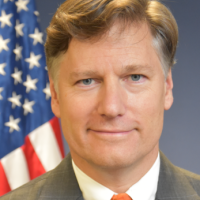
Christopher Landau

Arturo Sarukhán
Advisory Board Member, Mexico Institute, Wilson Center; Former Mexican Ambassador to the United States; Founder & President, Sarukhan + Associates

Earl Anthony Wayne
Former Career Ambassador to Afghanistan, Argentina, and Mexico; Distinguished Diplomat in Residence, School of International Service, American University
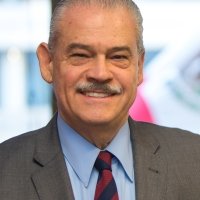
Miguel Basáñez

James Jones
Former U.S. Ambassador to Mexico; Chairman and CEO, ManattJones Global Strategies, LLC
Introductions
Hosted By

Mexico Institute
The Mexico Institute seeks to improve understanding, communication, and cooperation between Mexico and the United States by promoting original research, encouraging public discussion, and proposing policy options for enhancing the bilateral relationship. A binational Advisory Board, chaired by Luis Téllez and Earl Anthony Wayne, oversees the work of the Mexico Institute. Read more
Thank you for your interest in this event. Please send any feedback or questions to our Events staff.


